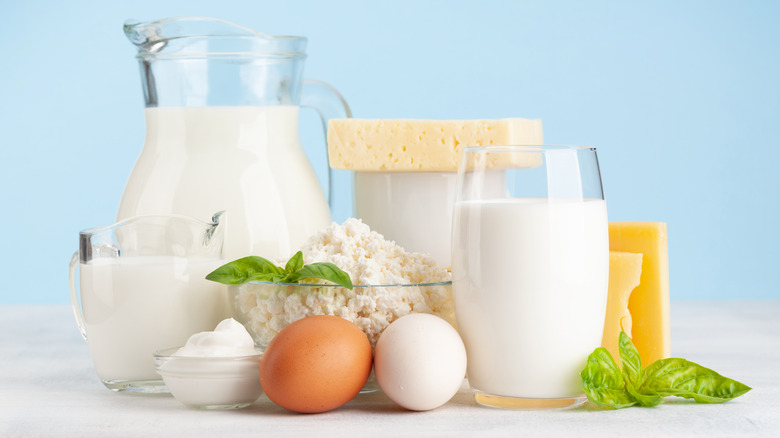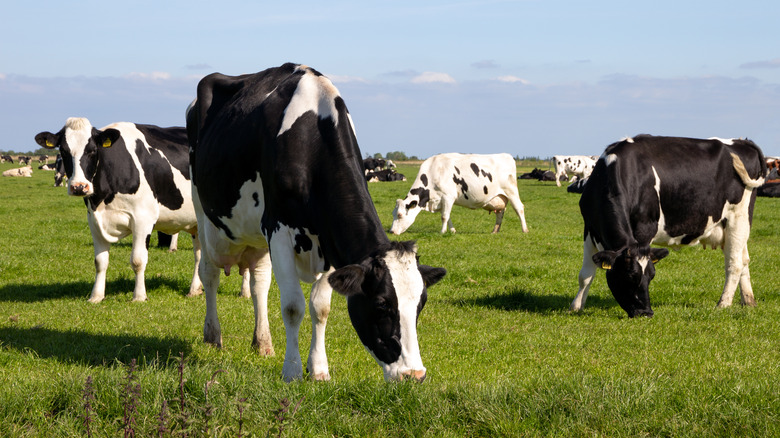Registered Dietitian Kara Lydon On Everything You Should Know About Eating Dairy - Exclusive Interview
Cutting your favorite foods completely out of your diet isn't ideal — and it usually makes sticking to your new meal plan even harder. Luckily, losing out on dairy isn't something you'll ever have to worry about if you're trying to eat in a healthy way.
Though dairy has had a pretty unfair reputation over the years, it's actually packed with all sorts of vitamins and nutrients that can help keep your body in tip-top shape — just ask Boston-based registered dietitian and licensed dietitian nutritionist Kara Lydon.
Along with encouraging intuitive eating, dairy is something that Lydon has always recommended her clients consume regularly. She's made it easy by creating healthy and delicious recipes that include grass-fed dairy products on her blog, The Foodie Dietitian, and she shared some special ones with us.
In an exclusive interview with Health Digest, Lydon discussed exactly how you, too, can incorporate dairy into your daily diet — even if you happen to be lactose intolerant.
Her approach is all about intuitive eating
What is the practice of intuitive eating?
Simply put, intuitive eating is a journey of getting back to the way we were born to eat. When we were young, we ate when hungry and stopped when full, something we innately felt by listening to our body's cues. We were not born measuring portions, tracking macros, or counting calories, and we did not pay attention to any external forces telling us what we should or shouldn't eat to be healthy or thin. The drive to eat, or stop eating, was fully intuitive. Finding a way back to those internal cues is a large part of the intuitive eating practice.
Intuitive eating is a dynamic self-care framework that addresses the physical, biological, and psychological needs in eating. The intuitive eating model includes a set of 10 principles to work through including honoring hunger and fullness cues, rejecting diet mentality, rediscovering satisfaction in eating, making peace with foods, respecting your body, coping with emotions, and practicing gentle nutrition.
Here's how much dairy you should be eating each day
How much dairy should a person be eating each day?
The 2020-2025 Dietary Guidelines for Americans recommends that most Americans consume three servings of dairy per day, and while that's a helpful guideline to aim for, don't stress out too much about the number. As long as you're consuming dairy in a way that makes sense for you and you're including a variety of plant-based foods in your diet like beans and dark leafy vegetables, you should be meeting your calcium needs.
What myth about dairy do you hear most as a dietitian?
Many of my clients think that if they are lactose intolerant, they shouldn't be eating any dairy. Although they may result in similar symptoms, milk allergies and milk intolerances are two very different conditions and should be treated that way. A milk allergy is an overreaction of the body's immune system to the protein in milk, whereas an intolerance occurs when the digestive system is unable to break down milk properly, specifically the naturally-occurring sugar found in milk, lactose.
Although dairy allergies are rare, they are serious and can be life-threatening. Dairy intolerances, commonly known as lactose intolerances, are much more common, affecting approximately 65% of the population. Those with lactose intolerance may experience symptoms such as gas, bloating, and diarrhea.
The good news is that lactose intolerance doesn't mean you have to cut out dairy completely. Most folks with an intolerance can tolerate small amounts of dairy at a time and can tolerate dairy products naturally lower in lactose, such as Greek yogurt and cheddar cheese.
The benefits of incorporating dairy into your daily diet
What benefits can eating dairy have for your body?
Dairy is a nutrition powerhouse containing 13 essential nutrients, each playing an important role in the body. Calcium, vitamin D, and phosphorous are important in building and maintaining strong bones and teeth. Potassium helps maintain healthy blood pressure, support heart health, and regulate fluid balance.
Vitamins A and D, zinc, selenium, and protein help to support the immune system. Vitamin A also helps maintain skin and eye health. B vitamins (riboflavin, niacin, and pantothenic acid) help your body convert food into energy. Iodine is key for brain and bone development during pregnancy and infancy and is associated with cognitive development in childhood.
What makes grass-fed dairy unique?
Grass-fed cows produce dairy with significantly more beta-carotene — an antioxidant and source of vitamin A — higher levels of beneficial omega-3 fatty acids, and an optimal ratio of omega-3 to omega-6. That's why I love choosing Truly Grass Fed – their butters and cheeses are sourced from cows that are 95% grass-fed (average of one cow for every two acres) and are Non-GMO Project Verified, Animal Welfare Approved by A Greener World, and free from growth hormones and antibiotics.
Including dairy in a healthy diet
What's a surprisingly healthy way that you can incorporate dairy into your daily diet?
You can add dairy as a nutrition boost to things you're already making at home like adding Greek yogurt to smoothies, oatmeal, dips, and baked goods, or adding cheese to salads, eggs, and grain bowls.
What's an easy way to cut calories while eating dairy?
There's no need to cut calories while eating dairy. Dairy can be a healthy part of a well-balanced diet that includes fruits, vegetables, whole grains, and lean proteins.
Should your dairy intake, or anything else about your usual diet, change at all when you become pregnant?
When you become pregnant, it's recommended to avoid unpasteurized soft cheeses as they may contain listeria, a bacteria that can lead to a food-borne illness that is particularly dangerous during pregnancy. There's also a small chance that pasteurized soft cheeses can contain listeria, so some may choose to avoid soft cheeses altogether.
What is the biggest misconception many people seem to have about dieting in general?
The biggest misconception people have about dieting is that diets work long-term, and if they don't, it's somehow their own fault. The truth is diets don't work long-term (5+ years) for the vast majority of folks, and research has concluded that dieting is the most consistent predictor of weight gain. The blame should not be pointed to the individual but instead to the $77 billion diet industry that profits off of programs that aren't sustainable and repeat customers that keep coming back.
For more information about intuitive eating and healthy recipes that include Truly Grass Fed dairy products, head over to Kara Lydon's website.
This interview has been edited for clarity.




